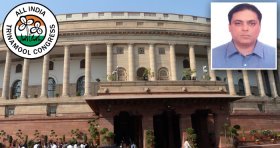December 19, 2017
Nadimul Haque speaks on The Indian Institute of Management Bill, 2017

FULL TRANSCRIPT
Respected Chairman/Deputy Chairman,
I thank you for giving me this opportunity. I would like to thank the minister for his introduction of this Bill. I stand before this house to support the Indian Institute of Management Bill, 2017. This Bill speaks upon a larger point of higher education sector and the regulations surrounding it. In a rapidly globalising world with technology taking centre stage, the higher education sector for a country like India, needs to push its youth population to not only change but rather reform the practices to become relevant in a global setting. Thus, the existing laws governing higher education in India needs to be reformed to address these requirements, towards which this bill has marked a correct step.
Before going into the specifics of this Bill, I would like to share one of my thoughts with the Minister. The HRD Ministry has announced to scrap UGC (University Grants Commission) and AICTE (All India Council for Technical Education) and replace it with HEERA (Higher Education Empowerment Regulation Agency).
However, private institutions must play a positive role in nation-building through quality higher education backed with quality research. New HEERA must therefore be sensitive to these aspects. Institutions like Harvard, Stanford, Oxford, MIT etc. earned their status of world class not through government guidelines or regulations but on their own remarkable and time tested policies for quality enrichment. It is time for higher education in India to find its proper place at global level and to minimise the outflow of lacs of Indian students in search of good institutions abroad. It is time for all those involved in drafting HEERA to revitalise the very thinking of encouraging a conducive environment for promoting quality education, emphasising autonomy and accountability, and fostering creativity and innovation, thereby pushing institutions to move towards world class.
Now coming to this bill specifically, I do have some concerns which I would like to share in this house. Firstly, I agree that IIMs have been given institutional autonomy in terms of funds, administration and recruitment of staff. However, this Bill does not talk about academic freedom. Most IIMs administrators direct their faculty to publish in North American research journals where publishing with Indian data is an overwhelming task. And this is done by the IIMs administrators for promotions. So is this academic freedom? So here is the peril of IIM Bill which replaces government power with new internal powers i.e. the institute board. At least, the government power was accountable to the people vis-a-vis Parliament, CAG, CBI, CVC, CIC etc. however the self appointing Board now is not accountable and in-fact it has become more opaque. Not only giving unlimited financial, organisational, and staffing autonomy alone would suffice, but academic freedom should be considered by the Minister, as, if it is put under full autonomy and no state control, academic freedom would be seriously endangered. My submission before this house and to the concerned minister is to have a balance between “Institutional Autonomy” and “Academic Freedom”.
Secondly, in the most recent budget the share of higher education was meagre 1.5%. So, with this small amount how will the government be able to maintain the quality of IIMs. Even though the expenditure of IITs and IIMs have increased but the Standing Committee Report in March 2017 states that these institutions have chronic shortage of resources and funds that deter them from becoming world class institutions. Further as per the 2017 Financial Times rankings too, only 3 IIMs feature in the list of Top-100 Management Schools in world. So if you are declaring IIMs of national importance and applauding it, the expenditure by the government towards higher education must also increase.
Thirdly, the present government established a Higher Education Financing Agency (HEFA). I am aware that Rs 2066 crore has been given to 6 institutes for research and development purposes and in future I am sure would be given to various other IIMs, NITs too. However, HEFA may not work practically. These institutes are given loan and not grants and hence these institutes have to pay from their internal revenues. This in turn will make education and other expenses in these institutes more expensive, as, authorities would now start exploring ways to increase internal revenues. IIT Madras has already hiked the fee. This may have a long lasting impact on the admissions to these institutes of national importance. So, I request the minister to consider the financing structure under HEFA before granting them to other institutes.
Fourth, I congratulate the Minister for giving all 20 IIMs the right to award MBA degrees, which previously could offer only Post Graduate Diploma in Management (PGDM). But now by bringing this change, MBA degree by IIIMs would be accepted universally. However, it will create a difference between IIMs and all the other private and semi-private institutions of management which are still stuck with PGDMs. Thus, a National Management University should be the next step to which all universities can get affiliated and issue MBAs like other IIMs.
Finally, a small provision but culturally an important provision. Through this Bill, the government is yet again trying to build a personality cult, wipe out history and demolish tradition and diversity. The Bill is trying to erode the value of IIM-Calcutta as a term. Furthermore, if the name IIM-Calcutta is changed to IIM-Kolkata (‘IIM-K’), it would be same as IIM Kozhikode (‘IIM-K’) which undermines the identity of both. So, the two distinctive brands should be protected and preserved.
Management Education is important in our country and I hope that the government takes these issues into consideration and see them as bolstering the potential of these institutes. Thus addressing these issues will drive our nation forward and give management leaders to India that it deserves.
Thank You.
